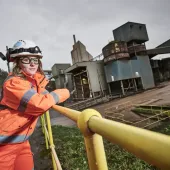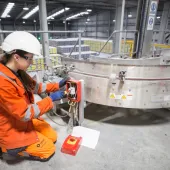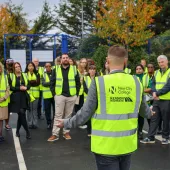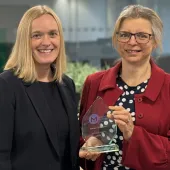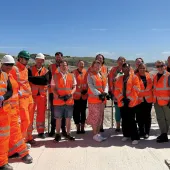Raising Health & Safety Standards in the Quarrying Industry
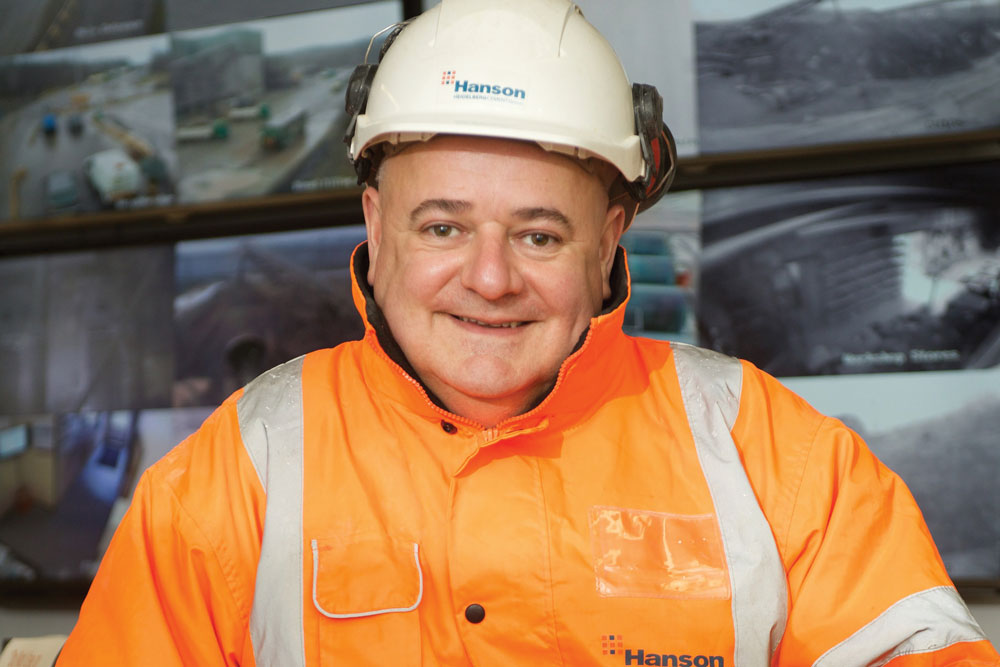
First published in the June 2017 issue of Quarry Management
How a focus on training and professional development within the quarrying industry is improving health and safety standards
The UK’s quarrying, cement and minerals industry wants high standards of health and safety to be the norm within this hazardous sector. By working closely with the Health and Safety Executive (HSE), the companies operating in the industry have reduced accidents by an impressive 76% over the past 10 years. How has this significant improvement in health and safety performance been achieved? In the main, it is thanks to the training and ongoing professional development of personnel at all levels within the industry.
Hanson UK are one aggregates, asphalt, concrete, contracting and cement business that have played their part in raising health and safety standards as part of this overall industry drive. The company has representation on the council of the Mineral Products Association (MPA), which has called on its members to become ‘fully competence assured’.
In practical terms, one of the outcomes of this focus for Hanson has been a major investment in management training and qualifications since around 2011. As part of the competence drive, and to improve succession planning within the health and safety team, a total of five employees are taking their NEBOSH Diploma. However, the requirement to take NEBOSH qualifications at Hanson has not been limited to health and safety specialists.
All company directors and senior unit managers must also pass their NEBOSH General Certificate. As part of a commitment made by the MPA to the HSE, staff at all levels are now expected to gain a health and safety qualification relevant to their role and responsibilities.
In 2013 the company appointed Nigel Clamp, who has a strong track record in improving management standards and reducing incident rates, to their health and safety team.
‘As an industry, we had decided we wanted a fully competent workforce,’ said Mr Clamp. ‘So, whether a mobile plant operator or a laboratory or weighbridge technician, and all the way up through the supervisory chain, every single individual in the company will be trained to a relevant standard by the end of 2017, costing in the region of £1 million per year.
‘We’re investing in our people and ours is now an industry that prides itself on competence, and that’s the same for us and all our competitors.’
From a personal perspective, this focus on improving competency through training and development has had a positive impact on Mr Clamp’s own career path.
A geology graduate, he started off as a quarry manager, small scale at first, but ultimately became manager of Europe’s largest granite quarry – Lafarge Tarmac’s Mountsorrel Quarry, in Leicestershire. It was only much later in his career, in around 2002, that he was asked to fulfil a health and safety role. He immediately took his NEBOSH National General Certificate in Occupational Health and Safety. ‘If you are going to be a professional in anything, you need to be formally qualified and then, as you progress, you need to ensure your knowledge progresses too,’ he said.
Mr Clamp has stuck by this. He has a long list of safety and environmental qualifications, including a NEBOSH National Diploma in Occupational Health and Safety, which he describes as the ‘benchmark qualification for health and safety professionals’. He is now close to achieving his ultimate goal of Chartered Membership of IOSH (CMIOSH) later this year.
Following his role as senior safety, health and environment manager, he moved from Hanson to parent company HeidelbergCement Group as health and safety director for Africa and the Eastern Mediterranean in 2016. Mr Clamp’s ability to demonstrate competency and his relevant experience has led to this senior role within the organization. He now leads a team of 28 safety professionals, responsible for cement works, quarries, ports and concrete plants in 18 countries across the region.
In this role he still believes competency is of vital importance, so he is putting candidates through the NEBOSH International General Certificate in Occupational Health and Safety. ‘It is critical we maintain competence of our health and safety network, so candidates from Turkey to Israel and Mozambique to Ghana will complete the Certificate as they develop their careers too,’ he said.
The quarry industry is not the only industry incorporating health and safety training into professional development programmes. With a background in chemistry, Dr Iain Wood initially joined the Oil, Gas and Industrial division of Exova as quality manager. However, as he already held the NEBOSH National General Certificate in Occupational Health and Safety, his manager asked if he also wanted to take on health and safety responsibilities for the division.
‘I welcomed it with open arms,’ said Dr Wood. ‘Primarily, the labs I am responsible for carry out destructive testing. Anything from hitting things with a very big hammer to exposing materials to H2S (hydrogen sulfide), which is toxic even at low levels and can quite easily kill people.’
As well as the NEBOSH National General Certificate in Occupational Health & Safety, Dr Wood had also taken the NEBOSH National Diploma in Environmental Management in the past. The National Diploma in Occupational Health and Safety was the perfect next move and his employers agreed. ‘When I was given the opportunity to do the health and safety role here, what I didn’t want to do was give out poor advice to the guys on site, so I suggested that I went on and did the NEBOSH Diploma,’ he said.
Dr Wood is already applying the knowledge he has gained to his workplace through his role as health, safety, quality and environmental manager. ‘To be honest, it has been fantastic. I have been able to take that knowledge and apply it practically in the workplace. It is interesting just looking at the improvements and the risk assessments we are doing. The accidents requiring first aid this year have gone down in our sector by 30% and that sort of thing is heart-warming because we are really addressing things. We are now trying to get anyone with health and safety responsibilities trained up to NEBOSH Certificate level. Keeping people safe at work is imperative.’
To ensure that health and safety improvements have the maximum success it is important that the whole workforce is engaged in the process of equipping every staff member with a health and safety qualification. The training developed should reflect the individual requirements of each recipient.
Although some employees may feel intimidated by formal training courses and assessments, good health and safety practices are based on knowledge and experience in addition to high-quality training, so a lack of academic ability should not preclude an employee from becoming a really competent health and safety practitioner.
In recognition of this fact, NEBOSH has ensured that there are a number of different routes available to access its qualifications. For example, assessments for its Award-level qualifications, which provide an introductory understanding of health and safety principles and practice, are multiple choice – making them less intimidating and more accessible to people who may find written examinations challenging.
It is thanks to taking this kind of all-encompassing approach to health and safety training that the quarrying industry and many other sectors have been able to achieve such an improvement in their health and safety record.
- Subscribe to Quarry Management, the monthly journal for the mineral products industry, to read articles before they appear on Agg-Net.com


